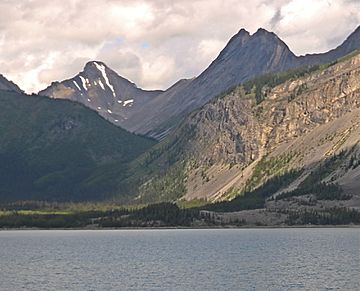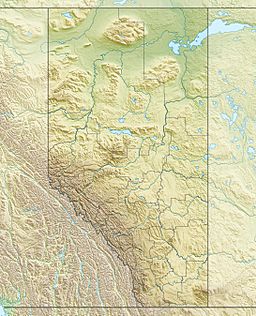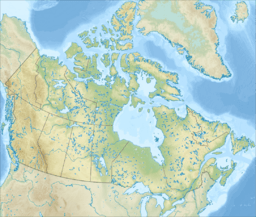Mount Invincible facts for kids
Quick facts for kids Mount Invincible |
|
|---|---|

Warspite (left) and Invincible (right) seen from Upper Kananaskis Lake
|
|
| Highest point | |
| Elevation | 2,700 m (8,900 ft) |
| Prominence | 140 m (460 ft) |
| Parent peak | Mount Warspite (2860 m) |
| Listing | Mountains of Alberta |
| Geography | |
| Location | Alberta, Canada |
| Parent range | Spray Mountains Canadian Rockies |
| Topo map | NTS 82J/11 |
| Climbing | |
| First ascent | 1957 by F. Crickard, R. Higgins, Hans Gmoser |
| Easiest route | Scrambling |
Mount Invincible is a tall mountain peak in Alberta, Canada. It stands 2,700-metre (8,900-foot) high. You can find it in Peter Lougheed Provincial Park, which is part of the amazing Canadian Rockies.
This mountain is easy to spot from Alberta Highway 40. You can also see it clearly from the Kananaskis Lakes area. Mount Invincible is close to Mount Warspite, which is a bit taller. Mount Warspite is about 2.6 km (1.6 mi) to the northwest.
Like many mountains in the Kananaskis Country region, Mount Invincible got its name from a famous sea battle. This battle was called the Battle of Jutland. It happened in 1916 during the First World War.
Contents
Why the Name Invincible?
Mount Invincible was named in 1917. It honors a British warship called HMS Invincible. This ship was a very large and powerful type of warship called a battlecruiser. Sadly, it sank during the Battle of Jutland in World War I.
The name for the mountain became official in 1922. This was decided by the Geographical Names Board of Canada. This board helps name places across Canada.
First Climbers to Reach the Top
The first time anyone climbed to the very top of Mount Invincible was in 1957. A team of climbers made this first successful trip. The climbers were F. Crickard and R. Higgins. They were guided by an expert climber named Hans Gmoser.
What Mount Invincible is Made Of
Mount Invincible is made of sedimentary rock. This type of rock forms from layers of sand, mud, and tiny bits of sea creatures. These layers were laid down over millions of years. This happened during periods from Precambrian to Jurassic times.
These rocks formed in shallow seas a very long time ago. Later, powerful forces inside the Earth pushed these rocks. They were pushed east and stacked on top of younger rocks. This process is called the Laramide orogeny. It helped create the Rocky Mountains.
Weather Around the Mountain
Mount Invincible has a subarctic climate. This means it has very cold and snowy winters. The summers are usually mild. Temperatures can often drop below −20 °C (−4 °F). With the wind, it can feel even colder, sometimes below −30 °C (−22 °F).
Rain and melting snow from the mountain flow into the Kananaskis River. This river then flows into the Bow River. The Bow River is a major river in Alberta.
 | Janet Taylor Pickett |
 | Synthia Saint James |
 | Howardena Pindell |
 | Faith Ringgold |



